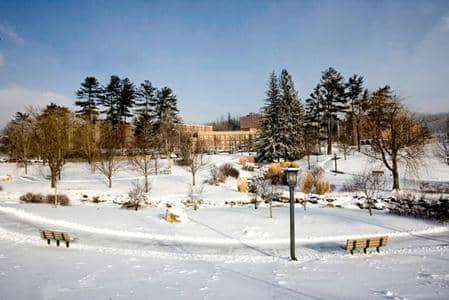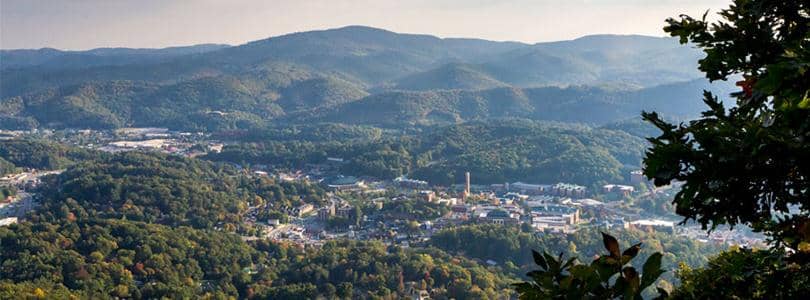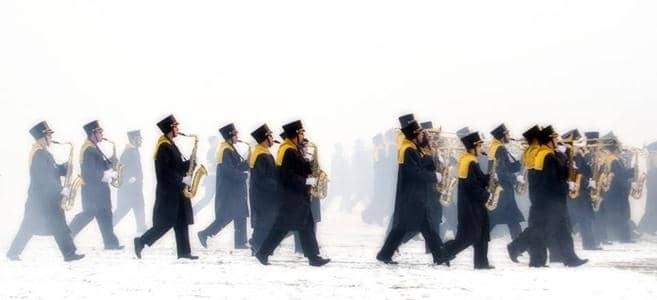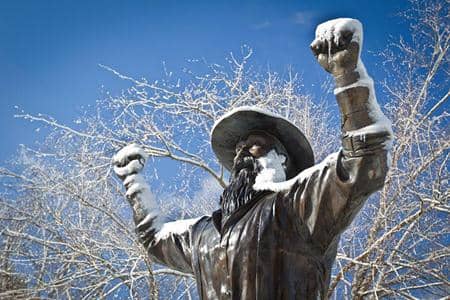Appalachian State University
Boone, North Carolina
Appalachian State University’s picturesque location and lively academic environment make it the perfect place to learn and grow. The University combines the intimacy of a smaller school with the research opportunities of a larger institution to provide students with the ultimate learning experience.
Get to know Appalachian State University
College Highlights
FIRST YEAR SEMINAR
Every freshman at Appalachian State is required to take a First Year Seminar (FYS). A FYS is an introductory course that eases students into college-level academics. Seminars also help students develop their critical thinking, writing, and research skills. Class sizes are small, which allows for more one-on-one attention from faculty. Students are taught to work as a community of learners that seek similar goals. Seminars range in topic, so students should check the course catalog to find the class that suits their interests. Below are a few examples of seminars that have been offered in the past:
Art, Politics, and Power: This seminar is great for students interested in art and the power is wields over countries and people. Students will explore topics like murder, collection, thievery, and destruction—all of which have been done for the sake of art. The seminar also explores power and politics, and how countries have “gained” from destroying their enemy’s artworks.
Climate Change: Climate change is both local and global. It affects everyone, and our understanding of this concept will shape future laws and policies. Unfortunately, there is a great deal of controversy surrounding the topic. So many scientists, and even the general public, have differing opinions on climate change, and this makes it difficult to reach a consensus on policies. This seminar involves a lot of class discussion. Students work together to dissect case studies and scholarly articles.
Image of the Child: This is a unique course that explores what it means to be a child. There are many factors that shape the ways we view children. Image of a Child examines the ways we treat children, what we expect of them, and how they should behave. Students are asked to think critically and challenge the impact of beliefs on actions.
COMMON READING PROGRAM
All first year students are asked to read a book before they arrive on campus. The Common Reading Program is a shared academic experience among all students. By reading the selected book, students become part of a community before they even start classes. The common reading connects students and introduces them to college-level coursework. The book is given out during Phase 1 orientation, and students must finish it before they return in the fall.
EDUCATION ABROAD
The Office of International Education & Development is the number one resource for study abroad. The office staff can help with decisions regarding program selection and scheduling conflicts. Students need only make an appointment, and an advisor will sit down and answer all their questions. The office also offers workshops to prepare students for their abroad experience.
STUDY ABROAD 101
All students that intend to go abroad must first attend Study Abroad 101. The workshop covers all the abroad opportunities available at Appalachian State and gives students an idea of what to expect. Topics covered in the workshop include: program types, tips on how to find a program, costs, coursework and approval, scholarships, financial aid, and the application process. After students have completed Study Abroad 101, they are invited to take Study Abroad 102, which aids in the application process and helps students find courses abroad.
STUDENT RESEARCH
Undergraduate research allows students to create original bodies of work within their field of study, whether that is through a thesis or an experiment. Research demonstrates to employers that a student has gained hands on experience working with industry-related topics. It also shows that a student has extended knowledge of a topic within their area of study. The Office of Student Research, established in 2005, opens up possibilities for students to engage in original inquiry and work. Appalachian State supports faculty-mentored research among students.
ENROLLMENT BY ETHNICITY
Non-U.S. Citizen: 0%
Hispanic/Latinx: 8%
Black or African American, non-Hispanic: 4%
White, non-Hispanic: 81%
Native/Indigenous American or Alaska Native, non-Hispanic: 0%
Asian, non-Hispanic: 2%
Native Hawaiian or other Pacific Islander, non-Hispanic: 0%
Two or more races, non-Hispanic: 4%
Race and/or ethnicity unknown: 1%
FACULTY-LED/SHORT-TERM ABROAD
There are many study abroad options available at Appalachian State. Among the opportunities are faculty-led, short-term trips. Programs led by faculty can last anywhere from a week to a month. Below are examples of Fall break programs (Fall 2015):
Business and Society in Cuba: The College of Business International Programs is traveling to Cuba for a week to engage in lectures at the University of Havana. Students will explored topics like US—Cuba Relations, the Embargo, and the history of Cuba. Lectures are connected to on-site visits, and student will be traveling to places like museums and government organizations.
International MBA Seminar—France: The Walker College of Business hosts a faculty-led abroad program in Paris and Angers. The trip lasts for 10 days and is part of the Walker MBA program. Students will engage with research, presentations, and guest speakers as they work through topics of international business.
Chancellor’s Scholars Voyages in Dublin: This abroad experience is all about the individual student and his/her career aspirations and personal needs. Participants, under the direction of a program leader, plan activities that suit their personal goals and career plans.
RESIDENTIAL LEARNING COMMUNITIES
Appalachian State embraces residential learning communities (RLCs) for the many benefits they offer in student development. Participants of RLCs often have better grades, are more involved, and enjoy academic support from faculty and peers. The University offers several RLC options that range from special interest to a First Year Seminar residence. Most RLCs involve a course or set of courses that link the residence component of the community to academics. Students engage in an educational experience in which their peers and faculty become part of the journey.
There are plenty of RLCs to choose from. Below are a few of the available communities:
Art Huas: Members of this community are interested in areas of visual art, which include: art history, graphic design, artistic design, and community outreach that explores the impact of art. The Art Haus is a creative, collaborative environment that is perfect for aspiring artists. Students in this RLC live among peers that share similar interests, across all concentrations of visual art.
Brain Matters: Brain Matters explores topics of the human condition, from cognition to emotion. This RLC approaches topics of human and animal development and behavior from a psychological perspective. Participants work with faculty and grad students as they dissect the reasons people do what they do.
New State of Mind: This RLC is perfect for students that are new to North Carolina. The transition into college can be difficult, and this can be much harder for out-of-state students that need to adjust to more than one environment. New State of Mind introduces students to the campus and surrounding community. With the support of faculty and peers, students will be expected to step out of their comfort zones and get involved with campus activities and groups.
THE SOPHOMORE YEAR EXPERIENCE (SYE):
The SYE RLC is only open to sophomore students, and is especially tailored to individuals still contemplating their majors. Sophomores enrolled in the SYE are required to take Life & Career Planning, a class that offers access to advisors and career counseling staff. SYE aims to help sophomores narrow down a career path through various resources and academic advising. Students involved in this RLC are engaged in several co-curricular activities that enhance the community experience.
Admission
TEST SCORES
Optional
FRESHMAN PROFILE
SAT Evidence-Based Reading and Writing
25th Percentile: 540 | 75th Percentile: 630
SAT Math
25th Percentile: 530 | 75th Percentile: 610
ACT Composite
25th Percentile: 22 | 75th Percentile: 27
ACT Math
25th Percentile: 20 | 75th Percentile: 26
ACT English
25th Percentile: 20 | 75th Percentile: 27
Tuition & Cost
Tuition (in-state): $4,242
Tuition (out-of-state): $19,049
Fees: $3,168
Room & Board: $9,174
Contact Appalachian State University
Contact Admissions
www.appstate.edu/admissions
(828) 262-2120
admissions@appstate.edu
Campus Location
287 Rivers Street
Boone, NC 28608
(828) 262-2000
Visit Appalachian State University Online



